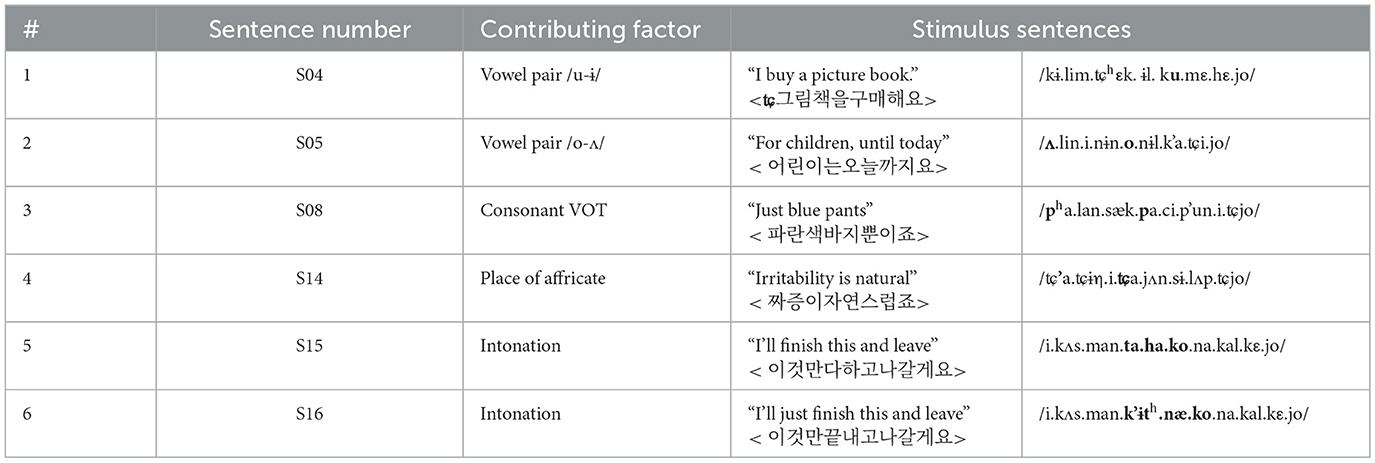- 1Konkuk Research Institute for Multilingualism and Multiculturalism, Konkuk University, Seoul, Republic of Korea
- 2Department of Korean, Konkuk University, Seoul, Republic of Korea
- 3Department of English, Konkuk University, Seoul, Republic of Korea
This study explored the acoustic characteristics of second-dialect speech that give rise to its accent perception. Specifically, North Korean (NK) dialect speech samples were collected from NK refugees in Seoul, South Korea. The simple sentences to evaluate potential phonetic predictors of NK accent were constructed and then six of them to test the vowel contrasts of /o-ʌ/ and /u-∔/, acoustic cues for stops, place cues for affricates, and intonation features were selected by trained phoneticians. Forty-nine native Korean speakers of the Seoul South Korean (SK) dialect rated the accentedness of the sentences produced by 34 NK participants. The results of the accent ratings as well as the acoustic measurements revealed that the contrast of the vowel pair /o-ʌ/, which had the opposite spectral relationship to that in the SK dialect, played the most important role in robustly predicting NK dialect accent. The contrast between lenis and aspirated stops showed its lowest rating, and NK speakers used both Voice Onset Time (for NK) and F0 (for SK) cues. The current results contribute to second-dialect acquisition by providing invaluable empirical data from NK refugees, which are still underexplored in this field.
1 Introduction
Regional accents that differ from those of listeners impede higher levels of language processing, much as the processing words in foreign-accented speech can be more effortful and error-ridden than in native accents (Arnhold et al., 2020; Floccia et al., 2009). The present study explores the acoustic predictors of perceived regional accent, based on the understudied North Korean (NK) dialect produced by NK refugees residing in the Seoul metropolitan area. Although North and standard Seoul South Korean (SK) dialects are mutually intelligible, linguistic divergence has been observed in phonology, morphology, grammar, pragmatics, and most noticeably, in the lexicon, mainly because North and South Korea have used different language policies since their separation after the Korean War. North Korea banned the use of Chinese characters and prohibited the influx of loanwords in terms of nativizing them, whereas South Korea was open to non-native words, actively accepting foreign and loan words, both Sino-Korean and Indo-European (Choi, 2025; Lee, 2022; Sohn, 2001). The geo-political separation and different language policies led SK and NK that were originally the same to experience linguistic divergence, and today, the North Korea and South Korea are considered two different countries. After 1990, many North Koreans moved to the South because of severe poverty. As of March 2025, there were a total of 34,352 refugees from NK living in South Korea (The Ministry of Unification in Korea). Upon arrival, the refugees attend an adaptation program supported by the SK government to learn about the culture, language, and career paths in South Korea. As most NK refugees are stigmatized because of their economic status, many attempt to adapt to the SK community by hiding their NK identity and language (Kang and Yun, 2018).
The main goal of the present study was to identify the sources of the primary acoustic characteristics of NK dialect accents. Since we are exposed to a variety of NK dialects in SK society, not just one particular dialect, we explored the acoustic sources of the perceived NK dialect accents produced by NK speakers from different backgrounds. For this purpose, we used the methodology employed in previous studies on the phonetic sources of perceived foreign (L2) accents. Many studies have investigated the acoustic sources of perceived foreign accents (Anderson-Hsieh et al., 1992; Jilka, 2000; Sereno et al., 2016; Wayland, 1997). For example, Wayland (1997) examined the production of Thai vowels, consonants, and tones produced by native English speakers, focusing on which acoustic parameters influence native (L1) listeners' judgments of the perceived degree of accentedness. She found that among segments, only vowel differences in the spectral, as opposed to temporal, dimensions contributed to accentedness, indicating the larger role of vowel features than others in the rating of L2 accents. Idemaru et al. (2019, 2021) explored the acoustic sources of foreign accent in L2 Japanese produced by English and Mandarin learners. When examining segmental (vowels and stops) and suprasegmental (rhythm, tone, and fluency) features, they found one of the prosodic features (pitch accent and intonation) to be a strong predictor of foreign accent across the two L1 backgrounds, which was significantly stronger than the other prosodic features, vowels, and stops. Thus, previous studies suggest that the degree of foreign accents differs according to the sound contrast types in L1–L2 pairs.
Studies have reported that the phonetic differences between NK and SK dialect are mainly observed in segments such as vowels or consonants. First, Table 1 presents the vowel inventory of NK and SK dialects.
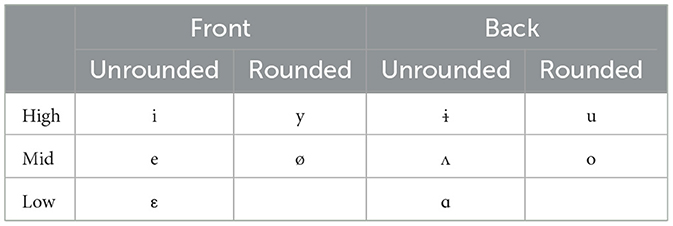
Table 1. Inventory of monophthongs in Standard Korean—South Korean (i.e., Pyojuneo) and North Korean (i.e., Munhwaeo; Kang et al., 2024).
Before the Korean War, Korean monophthongs comprised 10 monophthongs (/i, e, ε, ʌ, ∔, o, u, a, y, ø/; Shin et al., 2013). However, most SK speakers do not retain all of the monophthongs. First, /ε/ has been raised to and neutralized with /e/ (Eychenne and Jang, 2015; Lee and Cho, 2021). For example, Eychenne and Jang (2015) have investigated the production of /e/ and /ε/ across the different regional dialects and gender groups of younger generation speakers; they found that the contrast of these two vowels was largely lost. Moreover, Kang (2014) reported that when partitioned by age and gender, the /e-ε/ contrast seems marginally retained by older male speakers (specifically those born before 1962) in word-initial position alone. Second, /y/ and /ø/ have been diphthongized to /wi/ and /wε/, respectively (Kang and Yun, 2018; Shin et al., 2013). From ~1990, in both natural and real speech, these two vowels were never produced as monophthongs. Consequently, the SK dialect has seven monophthongs. Additionally, in SK, the vowel /o/ has been raised toward /u/ (Han and Kang, 2013), which in turn led to the closeness of /u/ to /∔/ (Kang, 2014; Kang and Kong, 2016). (Han and Kang 2013) examined these two vowels' acoustic characteristics and their Euclidean distance; they observed that /o/ became increasingly approximated with /u/, particularly in younger female speakers and non-initial positions. More recently, Kang (2014)—based on the analysis of a large corpus of data—observed that the vowels /∔/ and /u/ are realized with a higher F2 (equivalent to a more front vowel quality) among younger speakers. Based on this phenomenon, she argued that the SK vowel system appears to be undergoing the chain-shift change of the three vowels /∔, u, o/.
Unlike the SK vowels, few systematic phonetic studies have examined NK vowels. Based on the results of previous empirical studies on NK refugees, the NK dialect likely maintains the 10- (Lee and Idemaru, 2024) or 8-vowel system of monophthongs, with the diphthongization of /y/ and /ø/ (Lee and Ramsey, 2000). Namely, /e/ has lower F1 values (equivalent to a higher vowel quality) than /ε/, without overlapping values. The vowel /∔/ is produced in the back region of the vowel space, close to /u/. Additionally, NK and SK dialects differ in the spectral qualities of /o/ and /ʌ/—in NK, /o/ is lower than /ʌ/, while the opposite is true in SK.
Regarding consonants, NK and SK dialects reportedly differ in their use of acoustic cues for stops. Although both dialects have a three-way contrast in stops, namely lenis, fortis, and aspirated, the primary acoustic cues used to distinguish stops differ between the two. Before the early twentieth century, stops were historically distinguished based on the duration of their Voice Onset Time (VOT; Cho et al., 2002). The VOT values of stops are the shortest for fortis, moderate for lenis, and the longest for aspirated. However, recent phonetic studies (Bang et al., 2018; Kang and Guion, 2008; Silva, 2006) have shown that the SK dialect has considerable overlap of VOT values between lenis and aspirated stops; therefore, VOT is no longer a salient cue to differentiate them. Instead, the F0 in the vowel following the stop is used as the primary cue to differentiate lenis and aspirated stops, with a lower F0 for lenis stops than for aspirated stops. As a result, the three stops in SK appear to be distinguished based on VOT and F0: a very short VOT and high F0 for fortis stops, a long VOT and low F0 for lenis stops, and a long VOT and high F0 for aspirated stops.
By contrast, the production patterns of NK stops remain largely unknown owing to the lack of systematic phonetic studies on NK consonants. However, the results of previous studies on the NK refugees living in Seoul, South Korea (Kang and Yun, 2018; Lee et al., 2025) reveal that NK speakers distinguish the three stop categories by VOT, and F0 was not utilized robustly. In Lee et al. (2025), NK refugees participated in the tasks of reading aloud one-syllable words and short phrases, as well as a sociolinguistic interview. The results indicated that NK speakers distinguished the three categories of stops by VOT in all tasks, except for the phrase reading where fortis and lenis stops were barely distinguishable, while F0 was not utilized as robustly by NK speakers as by SK speakers. Although the empirical data on NK stops have focused on the two different dialects such as the Hamgyeong (Kang and Yun, 2018) and Pyongan dialects (Lee et al., 2025), these studies suggest that NK stops are still distinguished by VOT, and that the process of acquiring the second dialect remains incomplete. This has resulted in a major discrepancy in the phonetic characteristics of stops between the NK and SK dialects.
Similar to stops, the affricates in NK and SK have a three-way contrast, such as lenis, fortis, and aspirated; however, prior studies reported that NK speakers articulate affricates in a more anterior position than do SK speakers. Although the place of articulation of affricates in SK has been variably described as “palatal,” “postalveolar,” or even “alveolar,” previous studies have demonstrated more posterior articulation of SK affricates than alveolar fricatives (/s, s'/; Anderson et al., 2004; Kang and Kochetov, 2010). More recently, Kong et al. (2014) examined young SK speakers using the spectral peak frequency as an acoustic index of the place of articulation and found gender-related variations. The constriction locations of the females' affricates were closer to or as anterior as the alveolar fricatives, while the males' affricates were still posterior to the alveolar fricatives, supporting the post-alveolar place of affricates. Therefore, they argued that this gender-specific variation in SK affricates may represent an ongoing sound change led by female speakers. By comparison, no research has investigated the place of NK affricates. Prior studies based on NK refugees residing in the Seoul metropolitan area from Northern Hamgyeong dialect (Kang and Yun, 2018) and Mandarin-Korean bilinguals using Northern Hamgyeong dialect or Pyongan dialect (Schertz et al., 2017) might provide a hint regarding the location of the NK affricates: Both groups of NK speakers produced the /tɕ/-initial words in various vowel contexts (including /i/) with higher center of gravity (COG) values than those of SK speakers. This result may indicate the NK speakers' more anterior articulation of affricates.
Unlike segments, objectively verified data are lacking on the NK dialect's prosodic characteristics. In the SK dialect, the intonation structure is hierarchically organized such that an Intonational Phrase (IP) comprises one or more Accentual Phrases (APs), which in turn can have one or more words. The AP has the primary pitch pattern of “THLH” where “T” is realized as “H” if the vowel is preceded by fortis or aspirated consonants and “L,” elsewhere. The final syllable of the IP has a boundary tone; thus, the “H” in the last syllable of “THLH” is realized as “L” or “HL” in the statement sentences, and “H” or “LH” in the interrogative sentences (Jun, 2000). For the NK dialect, Lee and Cho (2021) impressionistic descriptions stated that the AP has the primary pitch pattern of “falling” (a pattern whereby the first syllable is “H” and the last syllable is “L”; “H…L”), and in the IP, the last syllable is associated with the boundary tone, namely, “L” for the statement sentences, and “H” for the interrogative sentences. However, experimental studies have not validated these impressionistic descriptions. Considering the dearth of relevant acoustic studies on NK prosody, exactly how the pitch patterns of NK speakers' AP and IP differ from those of SK speakers and whether NK speakers' pitch patterns are associated with their perceived NK accent remains unclear. Notably, NK speakers may produce sentences exhibiting the same prosodic pattern as SK speakers, or other unknown features may emerge in their productions.
Given that NK and SK differ in these segmental and presumably suprasegmental features, this study aims to explore the potential acoustic sources of the NK accent produced by NK refugees living in the Seoul metropolitan area. Specifically, we constructed target sentences, each containing one of the phonetic features in which the two dialects were shown to exhibit discrepancies. The phonetic features included vowel formants, VOT and F0 values of stops, place cues of affricates, and intonation contours. The target sentences produced by NK refugees were then presented to and rated by SK speakers. The accent ratings enabled us to evaluate the acoustic features that contributed the most to the perceived NK accent.
2 Method
2.1 Stimuli creation
The construction of the stimulus items for the rating task comprised three stages: preparation of the original stimuli, NK speakers' production of the target utterances, and trained phoneticians' analysis of the target utterances for stimulus selection.
2.1.1 Preparation of the stimuli
The phonetic targets were three vowel pairs (/æ, ε/, /∔, u/, /o, ʌ/), two stop consonant pairs (/p, ph/, /k, kh/), two affricate consonant pairs (/tɕ, tɕh/, /tɕ, tɕ'/), and three intonation pairs (3σ PP with L/H, 4σ PP with L/H, and 5σ PP with L/H). Each target sound pair was included in a carrier sentence. For example, the vowel pair /æ, ε/ appeared in the sentence /mε.mil.i.laη.mæ.sil.i.jo/ “buckwheat and plum.” We ensured that the carrier sentences were as simple as possible so the target sound would be prominent and other phonetic features would be less noticeable or unnoticeable. The delayed repetition technique (Flege et al., 1995, 2006) was used to elicit the target utterances, as shown in Table 2.

Table 2. Sample dialogues eliciting target utterances (with the target sound in bold; σ, syllable; PP, phonological phrase; L, beginning with a low tone).
Question-answer pairs were constructed, and the answers in each pair comprised the target sounds for analysis. A complete list of the dialogues (question-answer pairs) is provided in Supplementary Table 1. The elicitation materials were produced and recorded by two female NK dialect speakers in a soundproof booth using a Tascam (HD-P2) solid-state recorder and a microphone (Shure KSM 44). Question and answer sentences were recorded by two speakers, respectively. The recorded utterances were sampled at 44.1 kHz (16-bit resolution) on a PC, and the answers were used for ratings. One speaker was 58 years old, from the Pyongan and Yanggang provinces, and the other was 63 years old, from the Pyongan and Hamgyeong provinces. Both speakers had lived in South Korea for 5 years.
2.1.2 NK participants' production of the target utterances
The materials were aurally presented through headphones (Sennheiser HD 600) in a question-answer-question sequence, as shown in Table 3.
After hearing the question, participants were instructed to repeat the answer produced by speaker #2. The purpose of the delayed repetition task was to prevent direct imitation from sensory memory. In each trial, the participants first saw the written direction of the experiment presented at the center of the computer; this was followed by two sentence pairs for practice that were not included in the analysis. When participants clicked the mouse, the experiment began with 20 dialogues in one block (Block 1), followed by another block (Block 2). The 20 dialogue sets were presented twice in the two separate blocks. When participants produced the sentence, they pressed the “next” button on the computer screen, which led to the following dialogue set of sentences. Within each block, the presentation order of the target sentences was randomized. Between the blocks, the participants were allowed to rest for as long as necessary. The participants' responses were recorded, after which completed a questionnaire regarding their demographic and language background information. The participants were tested individually in a soundproof booth and the task lasted ~15 min.
Thirty-four refugees from NK served as participants in the production task. The participants comprised 26 females and 8 males, with ages ranging from 20 to 80 years (m = 52.38, SD = 17.32). They were born in various regions of North Korea, including Pyongan (n = 7), Hwanghae (n = 2), Hamgyeong (n = 22), Yanggang (n = 2), and Kangwon (n = 1). The age at which they had arrived in South Korea ranged from 10 to 68 years (m = 38.49, SD = 16.43). Most participants (n = 22) stayed in China for 0.4–17 years (m = 7.43, SD = 5.05) before entering South Korea. Their length of residence in South Korea ranged from 6 to 23 years (m = 13.78, SD = 4.64). The relative use of NK and SK dialects as self-reported by NK participants was, on average, 29% (range = 0–100, SD = 36.87) and 53.38% (range = 1–100, SD = 37.64) for NK and SK, respectively. Of the participants, 56% attended school in South Korea.
2.1.3 Trained phoneticians' analysis of the target utterances for selection of the stimuli
To verify that the 20 sentences contained the acoustic predictors of NK accents as intended by the authors, NK participants' productions of the target utterances were carefully examined by three trained female phoneticians who were native SK speakers, aged 33, 34, and 39 years. They were born and raised in the Seoul metropolitan area and are experts in Korean phonetics. Of the 680 recorded tokens (34 speakers × 20 sentences), 11 were excluded from the analysis owing to mispronunciations, incorrect productions, or deletion of the target sounds. The three raters heard each of the remaining 669 tokens and judged them in two stages: they rated each utterance for the degree of the NK accent, using a seven-point Likert scale (1 = no accent at all, 7 = very strong accent) and specified which of the three factors, including consonant, vowel, and intonation, contributed most to the NK accent, if any. The experiment was administered in a soundproof booth using PRAAT (version 6.4.21) MFC on a PC (17Z90R-ED7VK). After practicing with four tokens, the raters heard each target utterance through headphones (Sennheiser HD 600) and pressed the buttons on the computer screen for accent rating from 1 to 7, the main predictor of accent rating, respectively. The 16 buttons for “vowel,” “consonant,” “intonation,” and all possible combinations of the two or three predictors with the different presentation orders (e.g., “vowel, intonation,” “intonation, vowel, consonant”) appeared on the computer screen. The option of “others” was additionally provided for the response of the rating “1,” namely, the case in which the token was judged as having no accent at all. The raters were allowed to hear the utterance twice, using the “again” button. All tokens were presented in 14 blocks. The order of the utterances within a block was randomized. The results of the rating by three phoneticians are presented in Table 4.
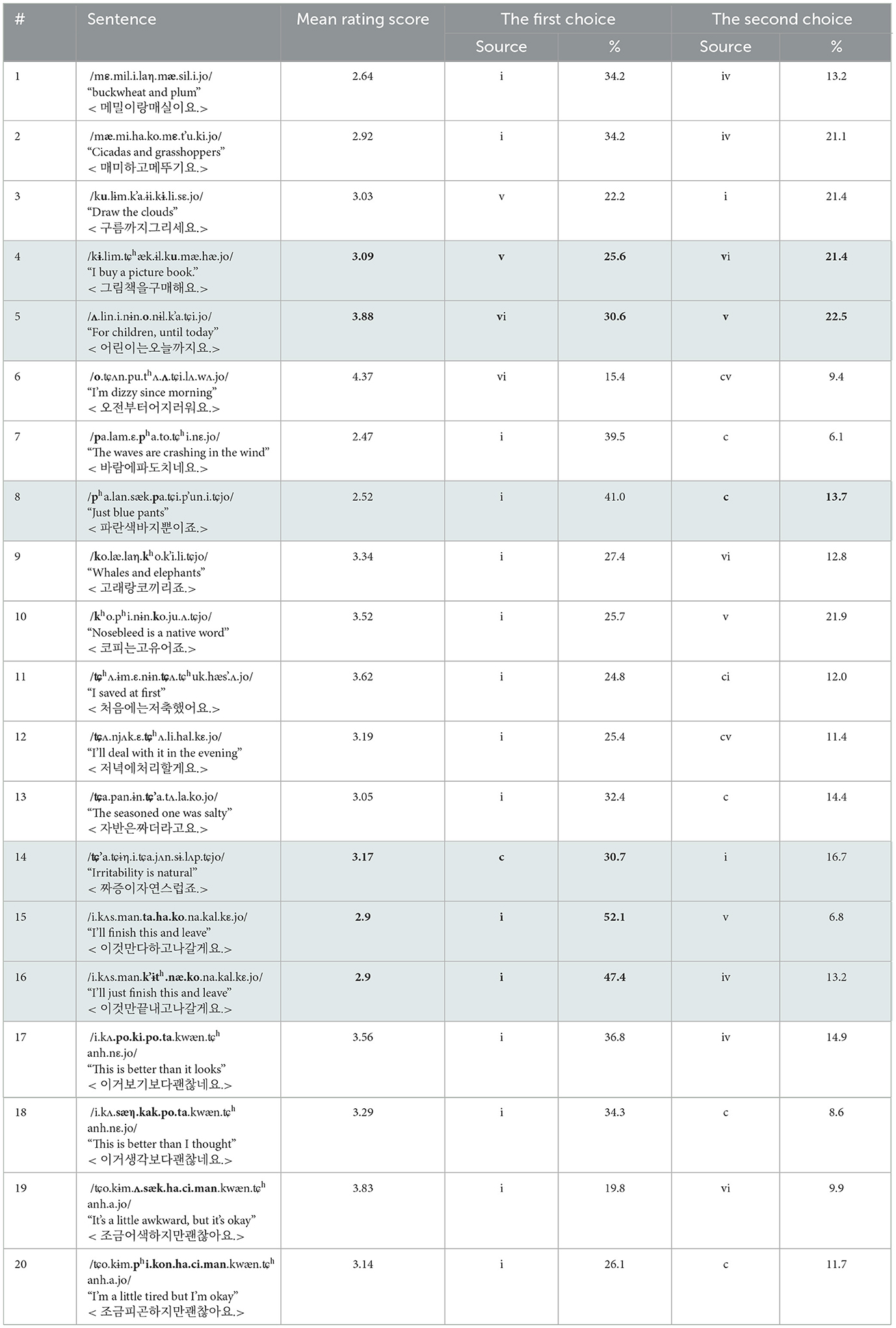
Table 4. The responses of the three raters for each sentence as a function of the contributing factors (vowel, consonant VOT, place of affricates, intonation; i, intonation; v, vowel; c, consonant) (target sounds in bold).
The final selection of stimuli was processed as follows: First, if the contributing factor was agreed upon between the authors and the three raters, the corresponding sentences were selected as stimuli. Only a single sentence satisfied this criterion: /tɕ'a.tɕ∔η.i. tɕa.jʌn.s∔.lʌp.tɕjo/ “Irritability is natural,” constructed to evaluate the factor of place of affricates. All sentences for the vowel pair /e-ε/ (/mε.mil.i.laη.mæ.sil.i.jo/ “buckwheat and plum” and /mæ.mi.ha.ko.mε.t'u.ki.jo/ “cicada and grasshopper”) were excluded due to the low contribution of these two vowels in the NK accent. Given that both sentences for the factor of the vowel pair /u-∔/ were shown to be contributing to the NK accent, the sentence with higher ranking scores was selected for stimuli (/k∔.lim. tɕhεk. ∔l.ku.mε.hε.jo/ “I'll buy a fairytale book”). The two sentences for the vowel pair /o-ʌ/ were judged to have the selections for vowel first and intonation second; thus, the sentence with higher rating scores was selected (/ʌ.lin.i.n∔n.o.n∔l.k'a.tɕi.jo/ “For children, until today”). All sentences that considered VOT had the highest ranking of intonation choices, and thus, was included for stimuli (/pha.lan.sæk.pa. tɕi.p'un.i. tɕjo/ “Just blue pants”). In all six sentences where intonation was considered, the factor of intonation was selected as the first choice; however, only two sentences with the highest ranking scores (/i.kʌs.man.ta.ha.ko.na.kal.kε.jo/ “I'll finish this and leave,” /i.kʌs.man.k'∔th.næ.ko.na.kal.kε.jo/ “I'll just finish this and leave”) were chosen among the six sentences, because the three raters identified that the intonation phrase (IP) boundary tones, rather than the second AP among the three AP phrases included in each target sentence exhibited noticeable intonation differences. Consequently, six sentences, as shown in Table 5, were selected as experimental stimuli, resulting in a total number of 203 tokens to be presented to listeners.
2.2 Participants (raters)
Forty-nine native Korean speakers of the SK dialect rated the accentedness of the sentences produced by the NK participants. The raters comprised 19 males and 30 females aged between 18 and 39 years (mean = 25.47, SD = 4.51). All raters were born and raised in the Seoul metropolitan area, except for one speaker who had experience of residing in the Chungcheong area < 1 year at age 7. None of the raters had resided outside Korea for more than 1 year (mean = 7 months, SD = 2.83 months). None of the participants reported speech or hearing disorders, and all were paid for their participation.
2.3 Procedure of the accent rating task
The participants were informed of the details of the experimental procedure and voluntarily provided informed consent before the experimental session. Each participant was tested individually in a sound-attenuated booth using Praat MFC (version 6.4.21; September 24, 2024). The participants judged the degree of the NK accent in each of the 203 stimuli, using a seven-point Likert scale (1 = no accent at all, 7 = strongly accented). When participants sat in front of a computer monitor wearing headphones, each trial began with an auditory presentation of a stimulus and the simultaneous visual presentation of the scale from 1 to 7. They could replay the token up to two times. After they rated the token, they pushed the “next” button on the bottom of the screen, after which the next token was presented auditorily. Before the trial began, a practice block of four trials was provided, the results of which were excluded from the analysis. All 203 tokens were presented in seven blocks (30 tokens for six blocks and 23 tokens for one block), and the participants were allowed to rest in between blocks, if necessary. Randomization was performed for the tokens within each block. The rating task lasted ~20 min. After the rating, participants completed a questionnaire on their demographic and language background information.
3 Results
3.1 Acoustic measurements
3.1.1 Vowel (F1, F2)
Each token produced by NK refugee participants was segmented, and the first and second formant frequency (F1 and F2) values were measured at the steady state of target vowels /o, u, ∔, ʌ/, using Praat scripts and the first author's visual inspection and correction. Of the 134 tokens, only five were manually corrected. The formant values were z-scored transformed for each speaker using Lobanov method (Lobanov, 1971) to allow for comparisons across gender and speakers. The F1 and F2 values of the four target vowels are shown in Figure 1.
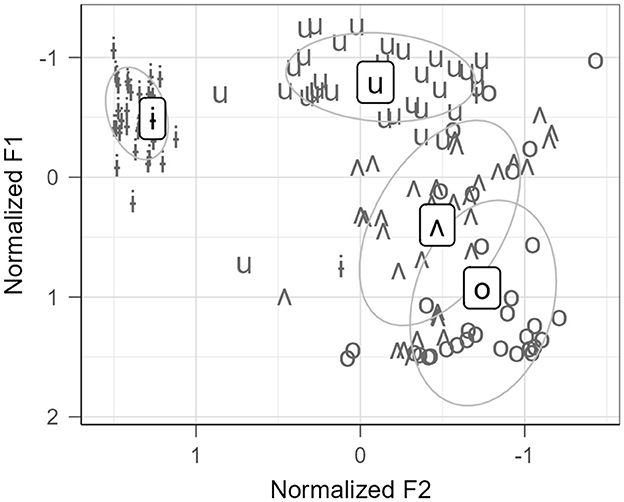
Figure 1. Plot of Lobanov-normalized F1 and F2 values of the vowels /o, u, ∔, ʌ/ produced by NK refugee speakers.
The vowels /ʌ/ and /o/ produced by the NK speakers are in the opposite position to those of the SK speakers regarding vowel height: the vowel /o/ is lower than /ʌ/ in NK as above, while /ʌ/ is lower than /o/ in SK, although there are some overlapping values between these two vowels. However, there is no overlap between the other vowel pair, /∔/ and /u/, as /∔/ remains in the central region—similar to its position in SK—contrary to impressionistic descriptions suggesting that /∔/ is close to /u/ in NK. It appears that NK refugee speakers quickly adapted to the SK dialect, pronouncing the vowel /∔/ as far from /u/.
3.1.2 Stop (VOT and F0)
The two primary acoustic cues for distinguishing lenis from aspirated stops, VOT and F0, were measured, and the results are presented in Figure 2. Using the Praat script, the VOT onset was measured at the time of burst and VOT offset at the time of the first visible indication of voicing (vowel), while F0 was extracted at the vowel midpoint (Bang et al., 2018).
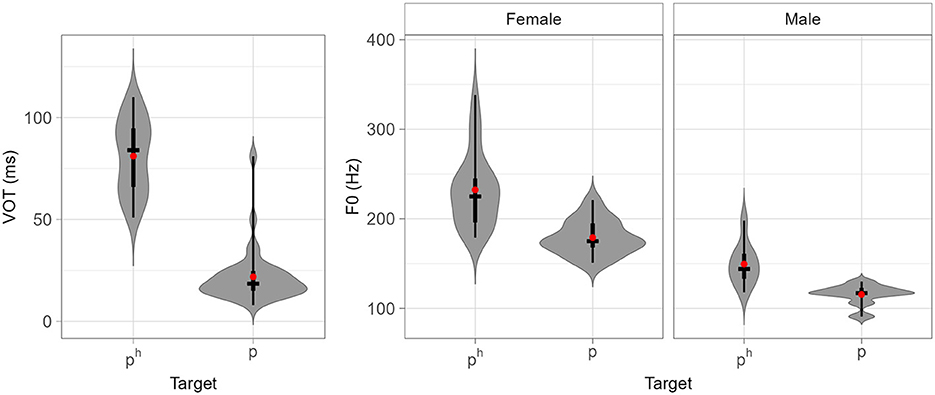
Figure 2. NK speakers' distributions of VOT (Left) and F0 (Right) values for /p/ and /ph/ (The bold horizontal line and small circle in each violin indicate the median and mean, respectively).
The mean VOT values for the lenis (/p/) and aspirated (/ph/) stops in Figure 2 (left) differ such that the lenis stops have a shorter VOT (mean = 21.9 ms) than the aspirated stops (mean = 81.1 ms), although the VOT values for the aspirated stops show larger inter-speaker variation than those for the lenis stops. The mean VOT values in the present study are comparable to those of the NK speakers with more than 3 years of residence in South Korea, as reported by Kang and Yun (2017). To evaluate this observation, a mixed effects linear regression model was performed through the package lmer4 (Bates et al., 2015) with VOT values as a dependent variable, phoneme type (lenis vs. aspirated) as a fixed factor, and participants as random intercepts. The statistical results revealed that there was a significant effect of phoneme type on VOT values [β = 59.235, SE = 3.508, t(33) = 16.844, p < 0.001]. The mean F0 values in Figure 2 (right) also differed between lenis and aspirated stops. In both male and female speakers, the F0 values for the lenis stops were lower than those for the aspirated stops, and these differences were confirmed by statistical analyses [β = −33.889, SE = 6.563, t(8) = −5.164, p < 0.001 for male; β = −53.280, SE = 6.93, t(24) = −7.689, p < 0.001 for female]. The results in Figure 2 indicate that the NK participants employed both VOT and F0 as primary cues to distinguish lenis from aspirated stops, suggesting that they maintained the VOT acoustic cues used to differentiate these stops in their NK dialect.
3.1.3 Affricate (COG)
To evaluate the place of articulation for affricates (/tɕ/ and /tɕ'/) in the NK dialect, spectral COG values were measured, using a 10-ms Hanning window at the of the frication noise in the affricates. The COG values were obtained using the function of “Get center of gravity” in Praat, with the default parameter for fricatives or affricates (power of 2).
It is widely known that the COG values are generally higher among female than among male speakers, before /i/ than other vowels, and in fortis than lenis affricates (Schertz et al., 2017). Thus, our results cannot be directly compared with those of Kang and Yun (2018). In our study, both female and male speakers were used for lenis and fortis affricates before the vowel /ɑ/, while Kang and Yun (2018) employed only female speakers for the lenis affricates while including all seven vowels. If we selectively compare the results for the variables common to these two studies (female and lenis category), the mean COG values in the present study (Figure 3) seem similar to those of the NK refugee speakers reported in Kang and Yun (2018); ~6,000 Hz). Therefore, the present study's NK participants had been changing how they produced affricates. Alternatively, Kang and Yun (2018) suggested that as affricates in SK undergo a sound change of fronting led by females (Kong et al., 2014), the use of anterior affricates is less stigmatized and thus, not easily associated with NK dialect features.
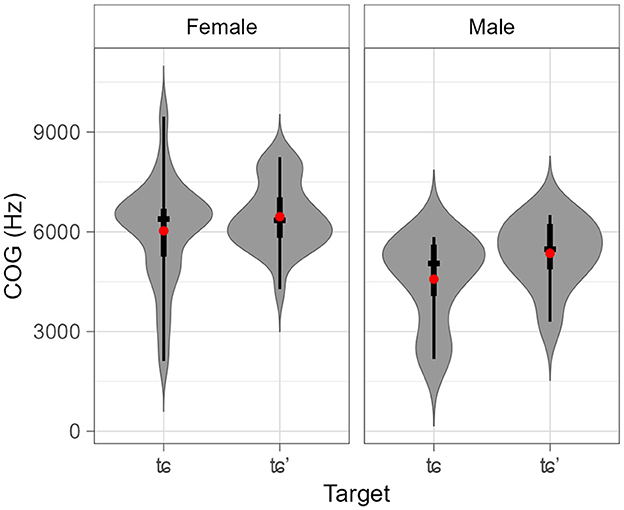
Figure 3. NK speakers' distributions of COG values for /tɕ, tɕ'/ (the bold horizontal line and small circle in each violin indicate the median and mean, respectively).
3.1.4 Intonation (pitch contour)
Unlike the impressionistic descriptions by Lee (2000), the realization of pitch did not substantially differ between NK and SK within the AP. Therefore, we examined the pitch changes in the entire sentence, which revealed a difference between the two dialects in a prosodically higher category than in AP, namely, the IP. The IP is marked by a boundary tone (%) which is realized on the phrase-final syllable in SK (Jun, 2000) and on the last two syllables in NK, with the pitch decreasing from the penultimate to the ultimate syllable (Lee, 2000). For example, in the IP /i.kʌs.man.ta.ha.ko.na.kal.k'ε.jo/ < 이것만 다하고 나갈께요> “I'll finish this and leave” (s15), the last AP (/na.kal.kε.jo/) can be realized as “nakalkε(H)jo(L)” in NK but “nakalkε(L)jo(L)” in SK.
In the acoustic analysis, two tokens among the 68 tokens (2 sentences × 34 speakers) were not included because of mispronunciation (e.g., [na.kal.kʌ.e.jo] for /na.kal.k'e.jo/) or sloppy pronunciation ([na.kal.k(e)]), which yielded 66 stimuli for analysis. To examine the IP boundary tone's contribution to the NK accent, the F0 values for the four syllables in the IP final position were measured, and z-score transformed to standardize across gender differences. Two patterns emerged in the F0 changes between the antepenultimate and penultimate syllables, namely falling and rising, which were considered characteristics of the SK and NK dialects in the impressionistic descriptions, respectively.
As presented in Figure 4, the F0 values decreased for NK participants in the falling group but increased for those in the rising group from the second to the third syllable. Of the total stimulus tokens, 25.76% (n = 17 out of 66) were realized with the pattern for the rising group.
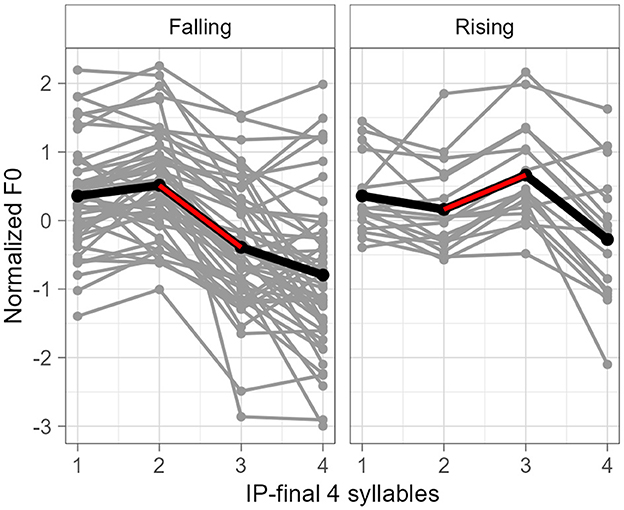
Figure 4. NK speakers' distributions of normalized F0 values across the four syllables in the intonational phrase boundary in Falling (left) and Rising (right) groups (the bold line in each figure indicates the mean F0 values).
To directly compare the IP's pitch patterns between the two dialects, we further analyzed the pattern of IP boundary tones of SK speakers, using a large-scale speech corpus from the AI HUB (kt alpha Co., Ltd., 2021; https://www.aihub.or.kr/; the Ministry of Science and Information and Communication Technology of South Korea and the Korea Institute for the Promotion of Intelligent Information Society). The simple statement sentences recorded by 46 SK speakers (18 males and 28 female speakers), ranging in age from 20 to 50 years, were randomly extracted from the speech corpus. The target sentences comprised four syllables and ended with /-jo/. The analysis of their intonation patterns revealed that, unlike NK refugee speakers, none of the SK speakers demonstrated a rising pattern between the antepenultimate and penultimate syllables (Supplementary Figure 1).
3.2 Accent rating
A total of 9,947 tokens were used for the analysis, calculated based on six sentence conditions across 34 speakers, with one sentence token excluded, and multiplied by 49 participants. The mean perceived NK dialect accent rating scores for each sentence condition are shown in Figure 5.
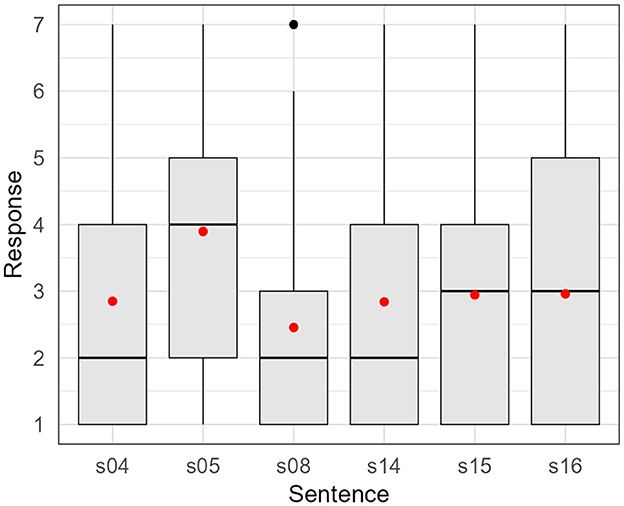
Figure 5. The mean perceived NK dialect accent rating scores as a function of sentence condition (the bold horizontal line and small circle in each box indicate the median and mean, respectively).
All six sentence conditions exhibited moderate NK accent rating scores, although there were large between-subject differences. This implies that each of the six factors represented in the target sentences contributed independently to the perceived NK accent to some degree. However, the target sentence s05, which contained the vowel pair /o-ʌ/, showed the highest rating score, while the sentence s08 for evaluating the VOT contrast of stops showed the lowest rating. The remaining four sentence conditions had similar accentedness scores of close to three. To test the effect of the target sentence condition on the participants' NK dialect accent rating scores, a repeated-measures ANOVA was conducted with the sentence condition (s04, s05, s08, s14, s15, and s16) as a within-subject factor. Only subject analyses (F1 analyses) were performed because of the relatively small number of sentence conditions (n = 6) for each of the 34 participants. There was a significant main effect of sentence condition [F(5, 240) = 79.68, p < 0.001]. Based on this result, a mixed-effects linear regression model using the packages lme4 and lmerTest (Bates et al., 2015) was used to evaluate the effect of each sentence condition on the NK dialect accent rating scores.
Specifically, a mixed-effects linear regression model with sentence condition as a fixed factor and speaker as a random effect [accent scores ~ sentence condition + (1|subject)]. All statistical analyses were performed at a significance level of α = 0.05. The reference level was set to “s04” and the different sentence conditions represent relative changes to it.
The results in Table 6 showed that sentence condition had a significant effect on responses: s05 (/o/ and /ʌ/) had a significantly higher mean value of accent scores than s04 (β = 1.047, p < 0.001), and s08 (the sentence containing the acoustic cues for stop VOTs) had a significantly lower mean scores (β = −0.394, p < 0.001) than s04. There was no significant differences for s14 (β = −0.009, p = 0.87), and s15 and s16 each showed a small increase, but only s16 was marginally significant (s15: β = 0.095, p = 0.088; s16: β = 0.11, p = 0.045). These results indicate the target sentence that manipulated the vowel contrast of /o/ and /ʌ/ and the sentence containing the acoustic cues for stop VOT showed significant effects, while one of the sentences with acoustic cues for intonation (i.e., s16) was marginally significant (p = 0.045). This is surprising because the two sentences, s15 and s16, containing intonation features were similar in structure but presented different statistical results. Hence, we conducted a post-hoc analysis using the emmeans package (Lenth et al., 2021) to examine the effect of interest held between these two sentences. We found that the two sentences did not show significant differences (p = 0.997); thus, they do not differ in their degree of accentedness (see Supplementary Table 2 for a complete pairwise comparisons among the six sentence conditions).
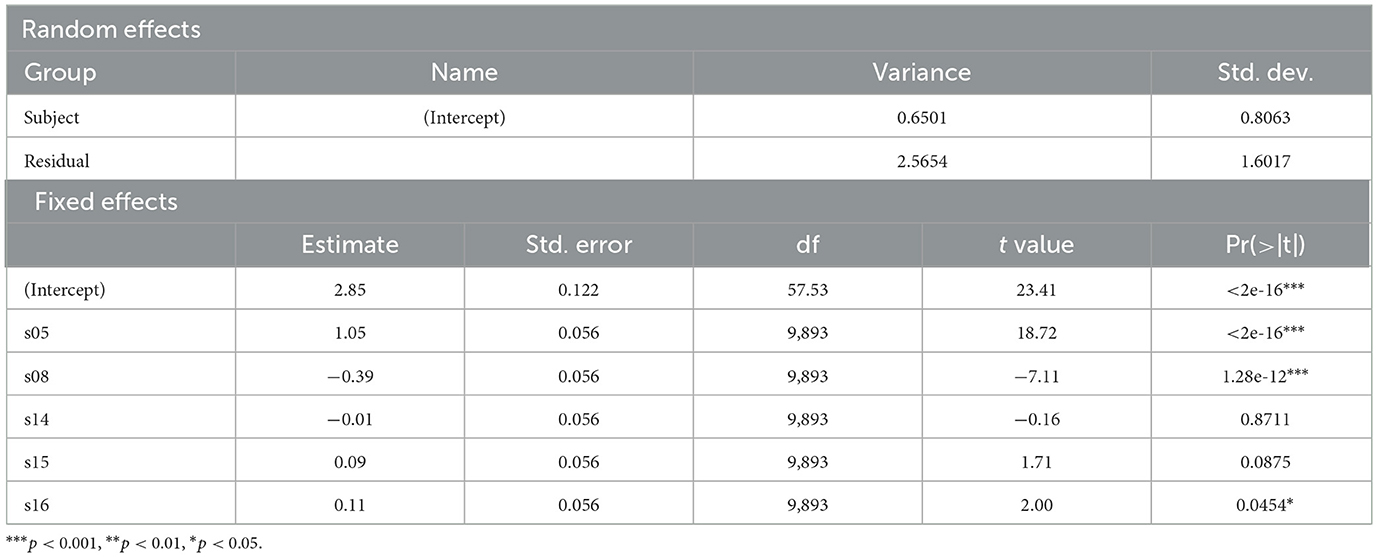
Table 6. Fixed and random effects in a mixed-effects linear regression model (reference level = s04).
Based on the two types of pitch patterns in the IP-final position (i.e., falling and rising), we further examined whether these two intonation patterns directly influenced the ratings of the NK dialect accent. Figure 6 shows the mean perceived NK dialect accent rating scores as a function of the rise and fall in pitch across a phrase.
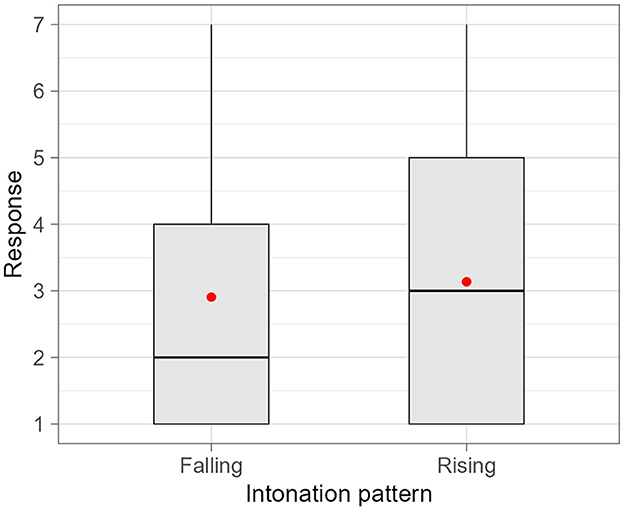
Figure 6. The mean perceived NK dialect accent rating scores as a function of IP-boundary tone changes (the bold horizontal line and small circle in each box indicate the median and mean, respectively).
The stimuli containing a pitch rise within the IP-final phrase (mean = 3.12) elicited higher NK accent ratings than those with a pitch fall (mean = 2.91). This difference was statistically significant [estimate = 0.2302, SE = 0.0651, t(3, 184) = 3.536, p < 0.001], suggesting that, while most NK speakers adapted to SK in the realization of IP-boundary tones, the remaining speakers maintained their dialect features, which directly affected the perceived NK dialect accent.
4 Discussion and conclusion
The present study investigated the acoustic sources of the perceived NK dialect accent in sentences produced by NK refugees in the Seoul metropolitan area and found that not all acoustic features predicted the degree of the perceived NK accent equally. Various phonetic features were examined, such as vowel formants for the two pairs of vowels, /u-∔/ and /o-ʌ/, stop VOTs, COG of affricates, and IP-boundary tones. Consequently, spectral features of the /o-ʌ/ pair emerged as the most robust predictor of accentedness, and acoustic features differentiating the lenis and aspirated stops were the weakest predictor. The remaining acoustic features were mildly correlated with NK accent ratings.
A comparison between the results of acoustic measurements and NK dialect accent ratings revealed a match between production and perception, except for the acoustic cues used to differentiate the lenis from aspirated stops. The distribution of /o/ and /ʌ/ between the NK and SK dialects significantly contributed to the perceived NK accent. In contrast to the vowel heights in SK, the NK participants produced /o/ lower than /ʌ/. The two vowels produced by the NK participants seemed to be close together, yet they did not exhibit a reversal in their relationship, as seen in SK. This difference likely directly influenced the perceived NK accent. However, the vowel pair of /u-∔/, the COG of affricates, and the pitch patterns appeared to be largely adapted to SK. Moreover, unlike NK speakers with limited exposure to SK, whose /∔/ was close to /u/, the NK participants produced /∔/ much further forward than /u/, with no overlap between the two vowels. Similarly, NK participants produced affricates further back in the oral cavity than typical NK speakers, which is a feature of SK speakers. The intonation patterns were also similar to those of the SK dialect for most of the NK participants; however, these results should be interpreted with caution. A small percentage of the NK participants' utterances showed a pattern different from that of the SK dialect, which resulted in a perceived NK accent.
The change in the production of the first regional Korean dialect and the subsequent change in its perceived accent when moving to a new region has been well-documented in previous studies of second dialect acquisition (Clopper et al., 2023; Conn and Horesh, 2002; Johnson and Nycz, 2015; Kang, 2022; Nycz, 2016). For example, Kang (2022) examined the production of word-initial tensification and /∔-ʌ/ merger, which are features of nonstandard Gyeongsang Korean dialect, in Gyeongsang-to-Seoul and Seoul-to-Gyeongsang transplants, and found that all speakers in these two groups produced Seoul (standard) forms only. In prosody, speakers from the southwestern dialect (i.e., the Jeolla dialect) area, especially female speakers, showed a rapid adaptation to the prosodic patterns of the standard, SK dialect, suppressing the pitch patterns of their home dialect when they moved to the Seoul metropolitan area (Kang, 2015). This may be related to the social evaluation of the dialects, where speakers from the non-standard regional dialect are likely to orient toward the standard dialect, which has greater overt prestige. Migration-triggered shifts in perception have also been observed (Evans and Iverson, 2007). Considering the social status of NK refugees and their language attitudes toward the SK dialect, adaptation to SK must have been far more rapid and intensive than in other second dialect acquisitions.
An exception in the match between production and perceived accent ratings was observed in the stop VOT. In the standard SK dialect, the primary cue to the lenis-aspirated stop contrast is shifted from the VOT to the F0 of the following vowel (Kang and Guion, 2008; Lee et al., 2020). The NK participants employed F0 to distinguish between these two stop categories, indicating their adaptation to SK. However, they simultaneously retained a large VOT difference between lenis and aspirated stops. Using both acoustic cues—namely F0, used in SK, and VOT, used in NK—might have led to the lowest perceived NK accent rating. One possible explanation for the use of both acoustic cues is that the NK participants are in the process of adapting to SK by using the cues for stops; therefore, they might easily pick up the F0 cue and then slowly lose the VOT cue. This result contrasts with the previous work in which VOT and F0 were measured in NK refugees in Seoul and only VOT showed a statistically significant difference between lenis and aspirated stops (Lee et al., 2025). In this work, the use of F0 cue by NK refugees in this context approached that of SK speakers, higher F0 for aspirated than lenis stops; however, NK refugee speakers' degree of differentiation of these two stops by F0 did not reach the level of SK speakers. The discrepancy between these results may be due to the difference in the length of residence in South Korea; in Lee et al. (2025), the NK refugees averaged 3.7 years (SD = 3.4) of residency at the time of experiment, while in the present study they averaged 13.78 years (SD = 4.6).
Relatedly, Lee et al. (2024) investigated the acoustic cue weighting of the Korean lenis-aspirated contrast in the perception and production of mobile speakers from Gyeongsang to the Seoul dialect region. The change in cue weighting in the standard Seoul dialect from VOT to F0 was observed more clearly in the use of the innovative F0 cue than in the abandonment of the conservative VOT cue, more salient for perception than for production. Furthermore, this trend was more robust for female than male speakers. Mobile speakers used F0 in the same way as Seoul speakers in both perception and production, whereas in the use of VOT, mobile speakers were similar to Seoul speakers in perception but more like their home dialect speakers in production. These results suggest that mobile speakers use the primary cue F0, which is required to be intelligible in SK, and continue to use the conservative VOT cue simultaneously. Lee et al. (2024) interpret this as an attempt to maintain the home dialect's identity in a new speech community. The retention of the VOT cue by NK refugees can be explained similarly. The NK refugees quickly acquired the Seoul dialect, but at the same time they revealed a subconscious desire to preserve their NK identity because it could be a way to maintain a connection to the home dialect.
The /o-ʌ/ pair was the most robust predictor of accentedness in this study. If the NK speakers produced the vowels /o-ʌ/ as typical NK dialect speakers, it would result in a strong NK dialect accent and threaten a phonological contrast, thus eliciting confusion regarding the lexical items that contained the two vowels. Recall that the vowels /o/ and /ʌ/ are in a completely inverse relationship between NK and SK regarding vowel height; thus, compared with aforementioned, non-categorical, phonetic features, the /o-ʌ/ pair can harm a phonological contrast, because there are many minimal-pair words in Korean containing these two vowels, such as /mol.ta/ “to herd (cattle)” and /mʌl.ta/ “far.” Therefore, the phonetic features of these two vowels appear to be more salient and easier to identify as a group-level property of the NK accent. Not pronouncing these two vowels, as in the SK dialect, does more than just harm the identification of words containing these vowels, but it also affects the social status of those who utter them. As most NK refugees are stigmatized because of their socio-political background, they try to adapt to SK to avoid potential discrimination. If the /o-ʌ/ pair contributes to the perceived NK accent as the most robust predictor, this is also socio-linguistically salient enough to elicit embarrassment and discrimination.
The present findings have pedagogical implications for both NK and SK speakers. When NK refugees arrive in South Korea, they attend an adaptation program to learn the SK language and culture for 12 weeks. Although the NK dialect is mostly intelligible to SK speakers, many NK refugees have difficulty learning the pronunciation of the second, SK dialect. For more effective learning within a limited time, NK refugee speakers need to know the differences between the NK and SK dialects and carefully investigate which differences have a greater impact on perceived NK accent. Simultaneously, the present findings can be utilized as a resource to educate SK speakers not to discriminate against NK refugee speakers owing to the pronunciation differences between these two dialects.
The present study has several potential limitations that would be important to address in future studies. First, the NK speakers who participated in this study varied in their demographic and linguistic backgrounds, and many participants were shown to have already adapted to the SK dialect within its many phonetic features because of the strong incentive to adapt to SK society. Without a control group representing NK speakers (unexposed to SK), it may be challenging to determine whether the NK refugees have fully adapted to SK, whether their speech patterns fall somewhere between NK and SK, or whether they align more closely with one variety over the other. The inclusion of NK speakers from a wide range of origins reflects the reality that the NK dialects encountered in SK society are often not specific dialects, but rather a mixture of dialectal features. Although the primary purpose of this study was not to provide a descriptive analysis of individual NK dialects but to explore the phonetic characteristics of perceived NK dialects, it is necessary to recruit more NK refugees with limited exposure to the SK dialect. Second, while the acoustic features for the NK accent were selected based on phonological descriptions or the results of acoustic measurements in prior work, the features not discussed in this study may also influence accent ratings. In particular, the target sentences for evaluating the intonation contour were relatively short, which may not reflect the variety of intonation patterns that occur in spontaneous speech. These issues should be addressed in future studies.
In conclusion, the present study examined the nature of perceived second-dialect features in the language production of NK refugees in Seoul, South Korea. Results demonstrated that among the phonetic features associated with vowel contrasts, stop and affricate contrasts, and intonation patterns, the spectral differences of the vowels /o/ and /ʌ/ played the most important role in the perception of NK dialect accent. The accent rating results were mostly consistent with predictions based on phonological and phonetic comparisons between the NK and SK dialects. The results of the present study can offer valuable insights into second dialect acquisition process by providing empirical data from NK refugees, un underexplored population in this field. Furthermore, the present findings have some important educational implications: They could help NK refugees learn the SK (second) dialect effectively and more importantly, to educate SK speakers not to discriminate against NK refugees based on dialect differences.
Data availability statement
The original contributions presented in the study are included in the article/Supplementary material, further inquiries can be directed to the corresponding author.
Ethics statement
The studies involving humans were approved by Konkuk University Center for Research Ethics. The studies were conducted in accordance with the local legislation and institutional requirements. The participants provided their written informed consent to participate in this study.
Author contributions
HJ: Data curation, Formal analysis, Investigation, Methodology, Project administration, Visualization, Writing – review & editing. JO: Methodology, Resources, Validation, Writing – review & editing. J-IH: Conceptualization, Funding acquisition, Investigation, Methodology, Supervision, Writing – original draft.
Funding
The author(s) declare that financial support was received for the research and/or publication of this article. This work was supported by the Ministry of Education of the Republic of Korea and the National Research Foundation of Korea (NRF-2023S1A5C2A02095124).
Acknowledgments
The authors would like to thank two reviewers for their thoughtful comments and suggestions, and Jong-Gun Kim, Jae-In Park, and Ha-min Jung for helping us recruit the North Korean participants. Thanks also to Yoonjung Kang for allowing us to share her work and JungYeon Hong for her assistance with subject running.
Conflict of interest
The authors declare that the research was conducted in the absence of any commercial or financial relationships that could be construed as a potential conflict of interest.
Generative AI statement
The author(s) declare that no Gen AI was used in the creation of this manuscript.
Publisher's note
All claims expressed in this article are solely those of the authors and do not necessarily represent those of their affiliated organizations, or those of the publisher, the editors and the reviewers. Any product that may be evaluated in this article, or claim that may be made by its manufacturer, is not guaranteed or endorsed by the publisher.
Supplementary material
The Supplementary Material for this article can be found online at: https://www.frontiersin.org/articles/10.3389/flang.2025.1624840/full#supplementary-material
References
Anderson, V., Ko, I., O'Grady, W., and Choo, M. (2004). A palatographic investigation of place of articulation in Korean coronal obstruents. Korean Linguist. 12, 1–24. doi: 10.1075/kl.12.01va
Anderson-Hsieh, J., Johnson, R., and Koehler, K. (1992). The relationship between native speaker judgments of nonnative pronunciation and deviance in segmentals, prosody, and syllable structure. Lang. Learn. 42, 529–555. doi: 10.1111/j.1467-1770.1992.tb01043.x
Arnhold, A., Porretta, V., Chen, A., Verstegen, S. A. J. M., Mok, I., and Järvikivi, J. (2020). (Mis)understanding your native language: regional accent impedes processing of information status. Psychonomic Bull. Rev. 27, 801–808. doi: 10.3758/s13423-020-01731-w
Bang, H.-Y., Sonderegger, M., Kang, Y., Clayards, M., and Yoon, T.-J. (2018). The emergence, progress, and impact of sound change in progress in Seoul Korean: implications for mechanisms of tonogenesis. J. Phonetics 66, 120–144. doi: 10.1016/j.wocn.2017.09.005
Bates, D., Mächler, M., Bolker, B., and Walker, S. (2015). Fitting linear mixed-effects models using lme4. J. Stat. Softw. 67, 1–48. doi: 10.18637/jss.v067.i01
Cho, T., Jun, S.-A., and Ladefoged, P. (2002). Acoustic and aerodynamic correlates of Korean stops and fricatives. J. Phonetics 30, 193–228. doi: 10.1006/jpho.2001.0153
Choi, K. B. (2025). “Language: language policy and linguistic nationalism in North and South Korea,” in Proceedings of the Joint Conference of International Society for Korean Studies and Research Institute of Korean Studies (Seoul: International Society for Korean Studies; Korea University), 35–51.
Clopper, C. G., Burdin, R. S., and Turnbull, R. (2023). Second dialect acquisition and phonetic vowel reduction in the American Midwest. J. Phonetics 99:101243. doi: 10.1016/j.wocn.2023.101243
Conn, J., and Horesh, U. (2002). Assessing the acquisition of dialect variables by migrant adults in Philadelphia: a case study. U. Penn Working Papers Linguist. 8, 47–57.
Evans, B. G., and Iverson, P. (2007). Plasticity in vowel perception and production: a study of accent change in young adults. J. Acoust. Soc. Am. 121, 3814–3826. doi: 10.1121/1.2722209
Eychenne, J., and Jang, T.-Y. (2015). On the merger of Korean mid front vowels: phonetic and phonological evidence. J. Korean Soc. Speech Sci. 7, 119–129. doi: 10.13064/KSSS.2015.7.2.119
Flege, J. E., Bohn, O.-S., and Jang, S. (2006). Degree of foreign accent in English sentences produced by Korean children and adults. J. Phonetics 34, 153–175. doi: 10.1016/j.wocn.2005.05.001
Flege, J. E., Munro, M. J., and MacKay, I. R. A. (1995). Factors affecting degree of perceived foreign accent in a second language. J. Acoust. Soc. Am. 97, 3125–3134. doi: 10.1121/1.413041
Floccia, C., Butler, J., Goslin, J., and Ellis, L. (2009). Regional and foreign accent processing in English: can listeners adapt? J. Psycholinguist. Res. 38, 379–412. doi: 10.1007/s10936-008-9097-8
Han, J., and Kang, H. (2013). Cross-generational change of/o/and/u/in Seoul Korean I: proximity in vowel space. J. Korean Soc. Speech Sci. 5, 27–33. doi: 10.13064/KSSS.2013.5.2.025
Idemaru, K., Kato, M., and Tsukada, K. (2021). “Foreign accent in L2 Japanese: cross-sectional study,” in Second Language Speech Learning: Theoretical and Empirical Progress, ed. R. Wayland (Cambridge: Cambridge University Press), 377–396. doi: 10.1017/9781108886901.016
Idemaru, K., Wei, P., and Gubbins, L. (2019). Acoustic sources of accent in second language Japanese speech. Lang. Speech 62, 333–357. doi: 10.1177/0023830918773118
Jilka, M. (2000). The contribution of intonation to the perception of foreign accent: identifying intonational deviations by means of F0 generation and resynthesis (Dissertation). Universität Stuttgart, Stuttgart, Germany.
Johnson, D. E., and Nycz, J. (2015). Partial mergers and near-distinctions: stylistic layering in dialect acquisition. U. Penn. Working Papers Linguist. 21, 109–117.
Jun, S.-A. (2000). K-ToBI (Korean ToBI) labelling conventions (version 3.0). Speech Sci. 7, 143–170.
Kang, H. (2015). The linguistic insecurity and the dialect shift of University Students From Gwangju and Jeonnam Area. J. Korean Dialectol. 21, 93–116.
Kang, J., and Kong, E. J. (2016). Static and dynamic spectral properties of the monophthong vowels in Seoul Korean: implication on sound change. Phonetics Speech Sci. 8, 39–47. doi: 10.13064/KSSS.2016.8.4.039
Kang, K.-H., and Guion, S. G. (2008). Clear speech production of Korean stops: changing phonetic targets and enhancement strategies. J. Acoust. Soc. Am. 124, 3909–3917. doi: 10.1121/1.2988292
Kang, Y. (2014). A corpus-based study of positional variation in Seoul Korean vowels. Japanese Korean Linguist. 23, 1–20.
Kang, Y. (2022). Acquisition of new dialect features by Seoul and Kyungsang Korean speakers: social and attitudinal factors influencing production (Dissertation). Georgetown University, Washington, DC, United States.
Kang, Y., Han, S., Ryu, N.-Y., Schertz, J., and Yun, S. (2024). “Front rounded vowels of heritage Korean in Northern China,” in The Phonetics and Phonology of Heritage Languages, ed. R. Rao (Cambridge: Cambridge University Press), 16–42. doi: 10.1017/9781108966986.002
Kang, Y., and Kochetov, A. (2010). Place of articulation and lingual coarticulation of Korean coronal obstruents: an electropalatographic study [Poster presentation]. LabPhon, Vol. 12. University of New Mexico, Albuquerque, NM, United States, July 8–10.
Kang, Y., and Yun, S. (2017). Dialect contact and word-specific phonetics: North Koreans in Seoul. J. Acoust. Soc. Am. 142(4_Suppl.):2583. doi: 10.1121/1.5014453
Kang, Y., and Yun, S. (2018). Acquisition of second dialect features by North Koreans in Seoul. [Poster presentation]. LabPhon, Vol. 16. University of Lisbon, Lisbon, Portugal, June 19–22.
Kong, E. J., Kang, S., and Seo, M. (2014). Gender difference in the affricate productions of young Seoul Korean speakers. EL 136, 329–335. doi: 10.1121/1.4896420
kt alpha Co Ltd. (2021). Number-Included Patterned Speech Dataset [Dataset]. AI Hub. Available online at: https://www.aihub.or.kr (Accessed June 29, 2025).
Lee, H., Holliday, J. J., and Kong, E. J. (2020). Diachronic change and synchronic variation in the Korean stop laryngeal contrast. Lang. Linguist. Compass 14:e12374. doi: 10.1111/lnc3.12374
Lee, H., Kong, E. J., and Holliday, J. J. (2024). The perception and production of Korean stops in second dialect acquisition. JASA Express Lett. 4:065202. doi: 10.1121/10.0026374
Lee, H. B. (2000). On the pronunciation differences between South and North Korean [Nam-Bukhaneo balum chaie gwanhayeo]. Gyoyuk Hangeul 13, 43–54. [in Korean]
Lee, I., and Ramsey, S. R. (2000). The Korean Language. Albany, NY: State University of New York Press.
Lee, J. (2022). Second dialect acquisition of North Korean refugees in Seoul (Dissertation). University of Oregon, Eugene, OR, United States.
Lee, J., and Idemaru, K. (2024). Investigating vowel differences in North and South Korea: phonetic analysis of younger speakers in read and conversational speech. Phonetics Speech Sci. 16, 7–23. doi: 10.13064/KSSS.2024.16.3.007
Lee, J., Idemaru, K., and Vaughn, C. (2025). Second dialect acquisition by North Korean refugee speakers: acquiring Seoul Korean stops. Lang. Speech 1–29. doi: 10.1177/00238309251334102
Lee, Y.-C., and Cho, S. (2021). The merger of/e/and/ε/in Seoul Korean tracing speakers born from the 1930s to the 1960s. Stud. Linguist. 61, 1–16. doi: 10.17002/sil..61.202110.1
Lenth, R., Buerkner, P., Herve, M., Love, J., Riebl, H., and Singmann, H. (2021). emmeans: Estimated Marginal Means, aka Least-Squares Means [Software]. Available online at: https://CRAN.R-project.org/package=emmeans (Accessed August 14, 2024).
Lobanov, B. M. (1971). Classification of Russian vowels spoken by different speakers. J. Acoust. Soc. Am. 49, 606–608. doi: 10.1121/1.1912396
Nycz, J. (2016). “Awareness and acquisition of new dialect features,” in Awareness and Control in Sociolinguistic Research, ed. A. Babel (Cambridge: Cambridge University Press), 62–79. doi: 10.1017/CBO9781139680448.005
Schertz, J., Kang, Y., Kochetov, A., Kong, E., and Han, S. (2017). Cross-language correspondences in the face of change: phonetic independence versus convergence in two Korean–Mandarin bilingual communities. Int. J. Bilingualism 21, 1–43. doi: 10.1177/1367006917728389
Sereno, J., Lammers, L., and Jongman, A. (2016). The relative contribution of segments and intonation to the perception of foreign-accented speech. Appl. Psycholinguist. 37, 303–322. doi: 10.1017/S0142716414000575
Shin, J., Kiaer, J., and Cha, J. (2013). The Sounds of Korean. Cambridge: Cambridge University Press. doi: 10.1017/CBO9781139342858
Silva, D. J. (2006). Variation in voice onset time for Korean stops: a case for recent sound change. Korean Linguist. 13, 1–16. doi: 10.1075/kl.13.01djs
Keywords: second-dialect accent rating, phonetic sources of second dialect, North Korean refugees, vowels, consonants, intonation
Citation: Jung H, Oh J and Han J-I (2025) Exploring the phonetic sources of the North Korean dialect accent produced by North Korean refugees in Seoul. Front. Lang. Sci. 4:1624840. doi: 10.3389/flang.2025.1624840
Received: 08 May 2025; Accepted: 28 July 2025;
Published: 01 September 2025.
Edited by:
Mark Antoniou, Western Sydney University, AustraliaReviewed by:
Yong-cheol Lee, Hannam University, Republic of KoreaHanyong Park, University of Wisconsin–Milwaukee, United States
Copyright © 2025 Jung, Oh and Han. This is an open-access article distributed under the terms of the Creative Commons Attribution License (CC BY). The use, distribution or reproduction in other forums is permitted, provided the original author(s) and the copyright owner(s) are credited and that the original publication in this journal is cited, in accordance with accepted academic practice. No use, distribution or reproduction is permitted which does not comply with these terms.
*Correspondence: Jeong-Im Han, amhhbkBrb25rdWsuYWMua3I=
 Hwanmin Jung
Hwanmin Jung Jeahyuk Oh2
Jeahyuk Oh2 Jeong-Im Han
Jeong-Im Han
